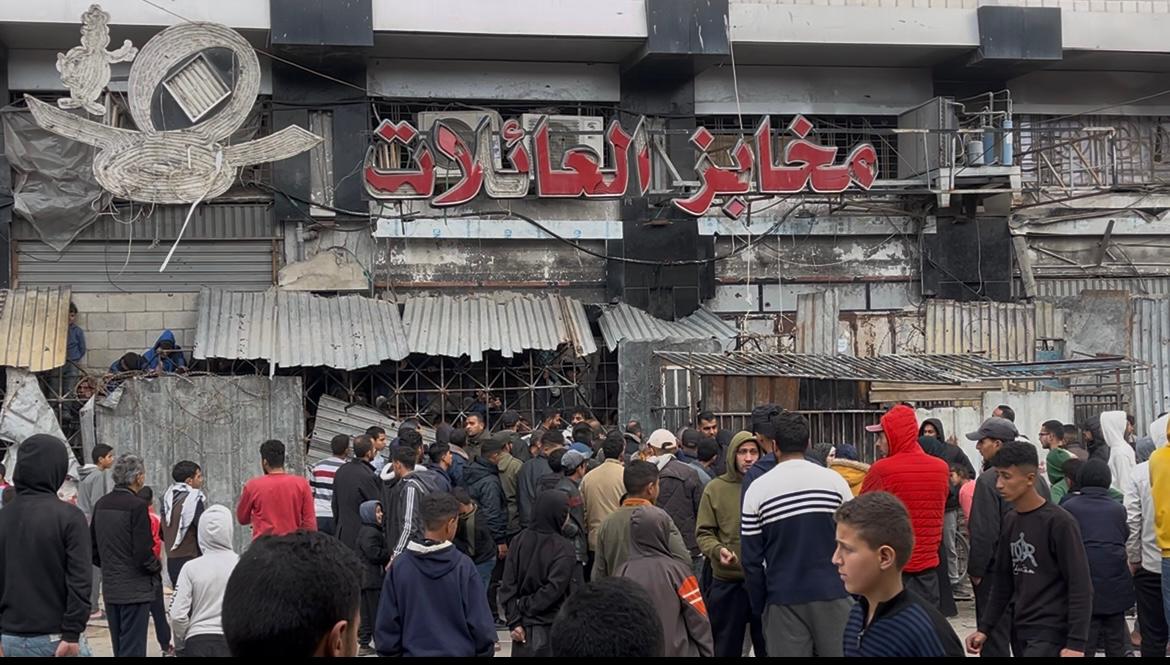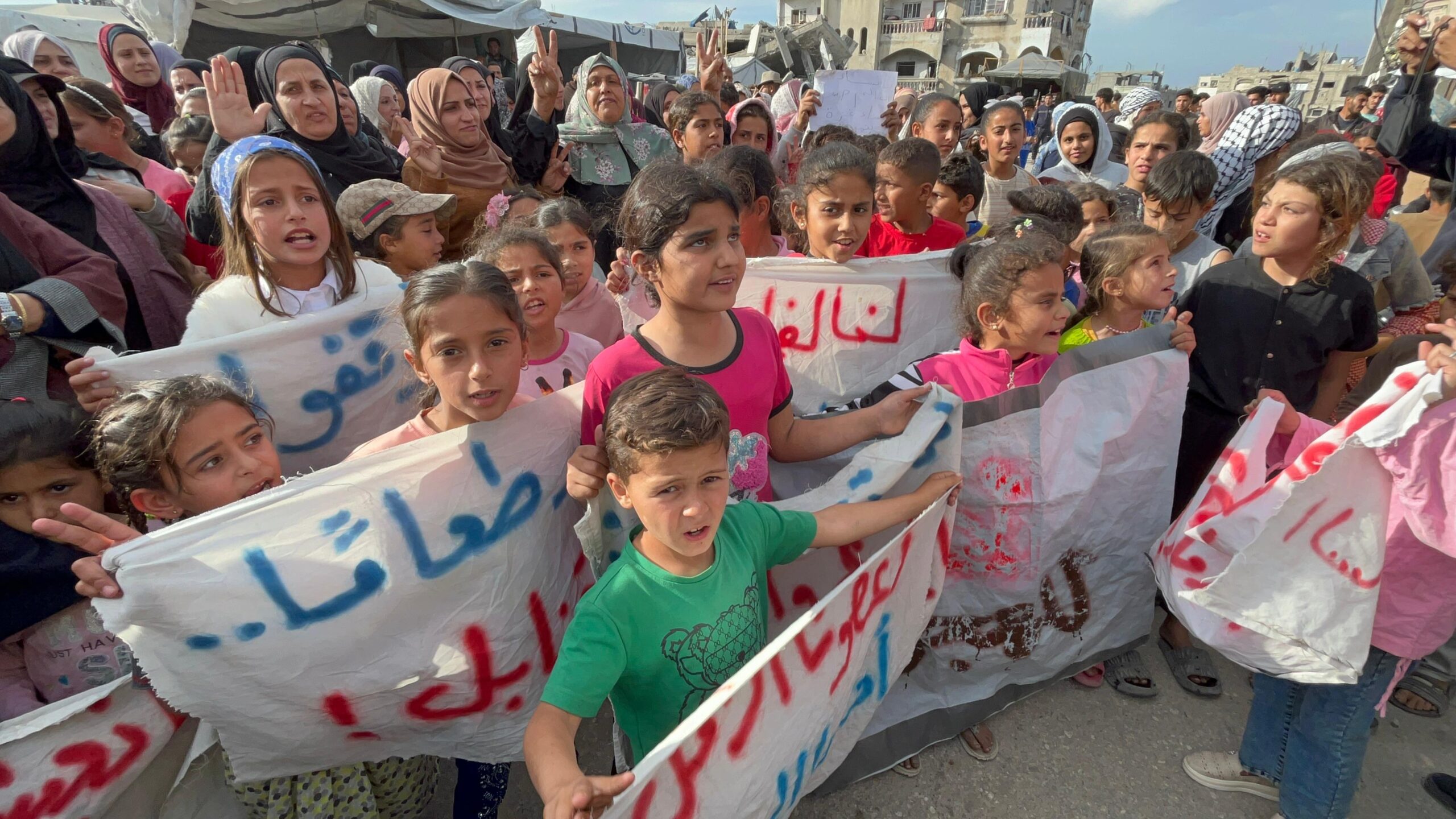‘We Gazans Are Starving as Closure Persists, Hamas Hoards, and Looters Steal’
As President Trump commits to helping the people of Gaza ‘get some food’ amid widespread Hamas looting, one Gazan reporter shares a first-person view of the hunger crisis in the Gaza Strip
More than two months into the suffocating total blockade, Palestinians in the Gaza Strip are suffering from unprecedented hunger. Emaciated children suffering from severe malnutrition are not a rare sight. According to a UN report from last month, over half the Gazan population is facing acute hunger, while 30% are experiencing “catastrophic food insecurity,” the highest level of hunger recognized globally.
Before the war with Israel broke out, Gaza was almost entirely dependent on imported food to feed its population. After the Israeli ground invasion of Rafah in May 2024, the last gateway to the outside world was shut down, leaving Gaza completely cut off from food sources.
Israel became the sole provider of food into Gaza, allowing some humanitarian aid shipments in through international organizations. A partial ceasefire that started on January 19, 2025, allowed hundreds of aid trucks to enter Gaza. But that arrangement quickly collapsed, and Israel once again sealed all crossings. For over two months now, not a single food truck has entered Gaza.
Some might wonder why Gazans don’t rely on fishing, since Gaza’s shoreline is nearly 25 miles long. But even before the war, Israeli forces strictly limited fishing zones and frequently opened fire on fishermen who exceeded the narrow boundaries allotted to them. During the war, the vast majority of fishing boats were destroyed, rendering the sea—once a vital source of food—unusable.
Lack of fish means almost Gazans are eating basically no animal protein. Gaza’s livestock sector was weak even before the war, and with widespread bombing and the total halt of veterinary and animal feed supplies, it has been wiped out. Livestock is no longer allowed into Gaza, making meat—including poultry—practically nonexistent in the strip. The majority of people in Gaza haven’t had meat for many months.
Gazans are also severely limited in their ability to grow fruits and vegetables. Israel has declared all border areas as buffer zones off-limits to civilians. Those areas include Gaza’s most fertile farmland, and farmers have been killed simply for approaching their lands.
Water supplies have been cut off across much of Gaza. As a result, home gardening is nearly impossible. Over 90% of Gazans do not have access to sufficient drinking water, so how can vegetables be grown?
Storing food isn’t much of an option either. Food storage requires money to buy in bulk—a luxury most Gazans cannot afford. Even if they could, there is no electricity to power fridges or freezers, as Israel cut off power to Gaza back in October 2023. Constant forced displacement—with more than 1.9 million people forced to flee their homes—also means that families can’t remain in one place long enough to store food.
This blockade has led to a total collapse of the food system. Every single bakery in Gaza has stopped operating due to the lack of fuel and flour. A single 25 kilogram bag of flour—which is supposed to be distributed for free—now costs over $230 on the black market. Most people survive on canned food, when available, and other extremely limited items that barely keep them alive.
This holiday season, give to:
Truth and understanding
The Media Line's intrepid correspondents are in Israel, Gaza, Lebanon, Syria and Pakistan providing first-person reporting.
They all said they cover it.
We see it.
We report with just one agenda: the truth.



Palestinians in the northern Gazan neighborhood of Al-Rimal stand in front of a shuttered bakery, April 2025. (Munir Jabbouri/The Media Line)
All the international kitchens that served food to poor residents have closed, since what was left in the storehouses has been stolen and since food isn’t being brought into Gaza.
There’s also an acute medicine shortage. I’m writing this while suffering from heart disease. Unfortunately, there’s no medicine available at public or private pharmacies.
The water issue is a very big problem. Water lines have broken down, but since Israeli soldiers are in the eastern part of the Gaza Strip, the municipal workers are unable to get there to fix them. Every morning, you see people with gallon jugs collecting water.

Children in northern Gaza’s Al-Rimal neighborhood filling up jugs with water amid the water crisis, April 2025. (Munir Jabbouri/The Media Line)
Who is responsible for the blockade and the hunger?
There are three sides to it.
The first party responsible is looters, just as Palestinian Authority President Mahmoud Abbas said in a recent speech.
The second party responsible is Hamas, which confiscates part of the food meant to feed civilians to feed its own forces.
And the main force responsible is Israel, which has blocked the entry of food into Gaza. International organizations like the United Nations and the Red Cross have warned about the danger of humanitarian aid being cut off to the strip.
In a message sent on Friday, President Abbas’ office condemned the looting of humanitarian aid warehouses. The office emphasized that it would hold such thieves accountable, noting that it knew the thieves’ identities.
The statement also condemned the escalation of Israeli crimes against the Palestinian people, namely the blockade and the famine in Gaza. It demanded that the international community act to stop these crimes.
In response to the looting, Hamas’ Interior Ministry announced the formation of a new police force called Sahem. This force has 5,000 officers tasked with fighting against looters. They have claimed that the thieves are collaborators with Israel who act according to Israeli military instruction.
Hamas has threatened that all thieves have a target on their back and has said that they will punish all law breakers, as well as merchants who have inflated their prices. Alongside this announcement, Hamas also announced a daily curfew and asked civilians not to go out after 9 p.m.
It remains to be seen what will become of Abbas’ and Hamas’ statements. For now, famine in Gaza is still a daily reality.
Editor’s note: As we go to press, it’s being reported that President Trump said he was pushing Israeli Prime Minister Benjamin Netanyahu to end the blockade on Gaza and allow more humanitarian aid in. “Hamas is making it impossible, because they’re taking everything that’s brought in, but we’re going to help the people of Gaza, because they’re being treated very badly by Hamas,” President Trump said.
This article was published under a pen name in order to protect the author’s security.

